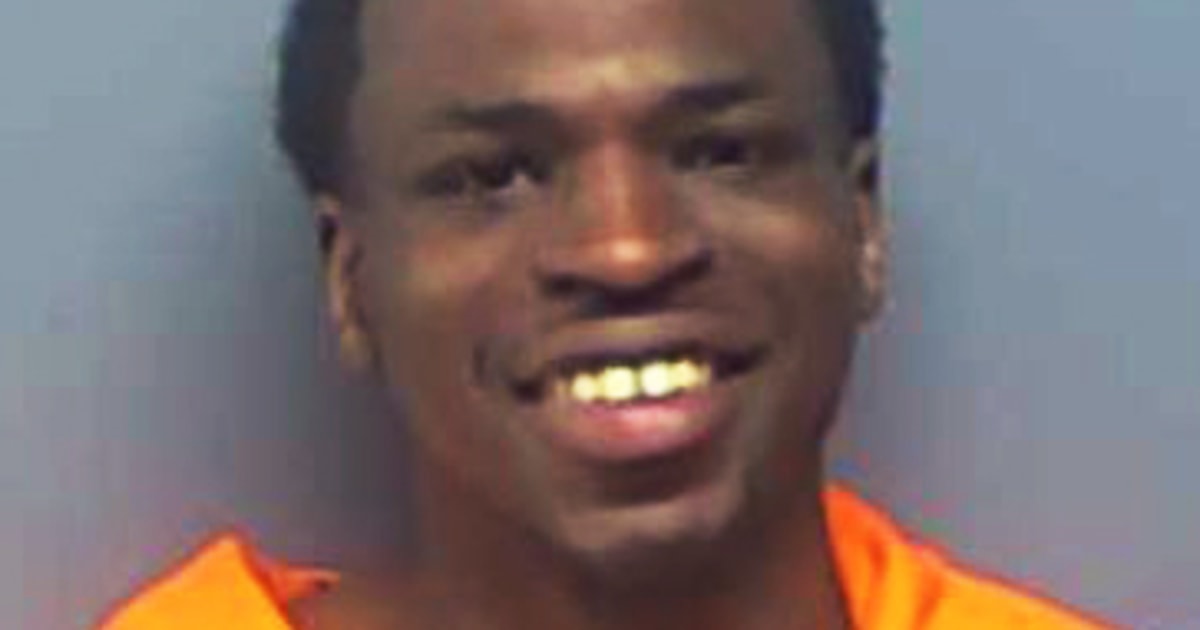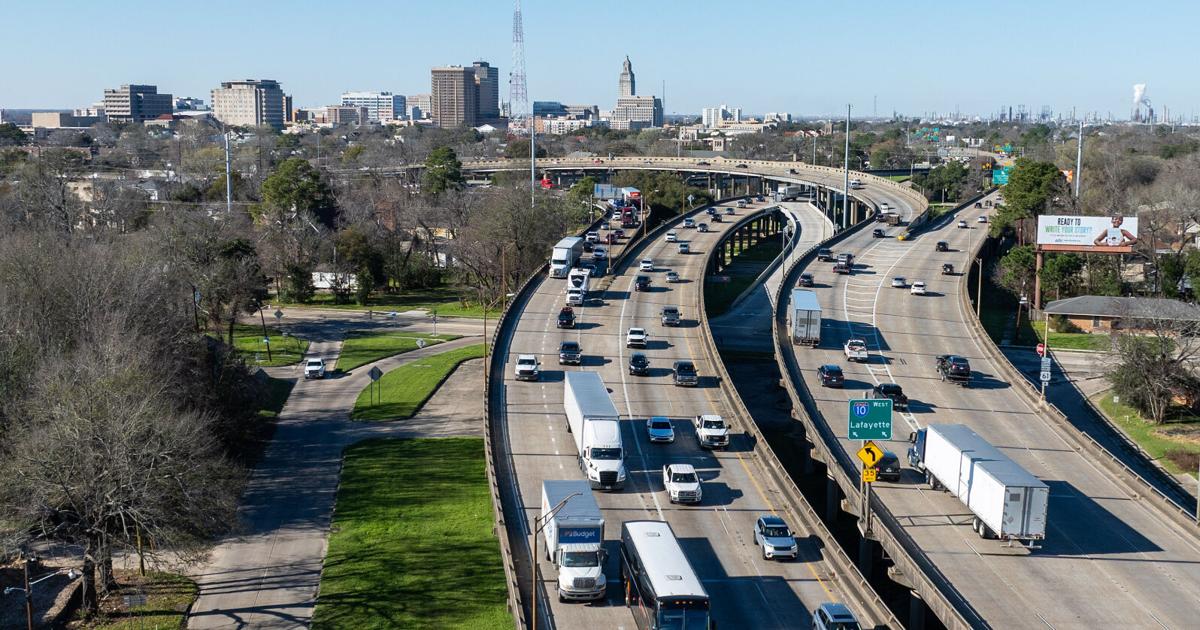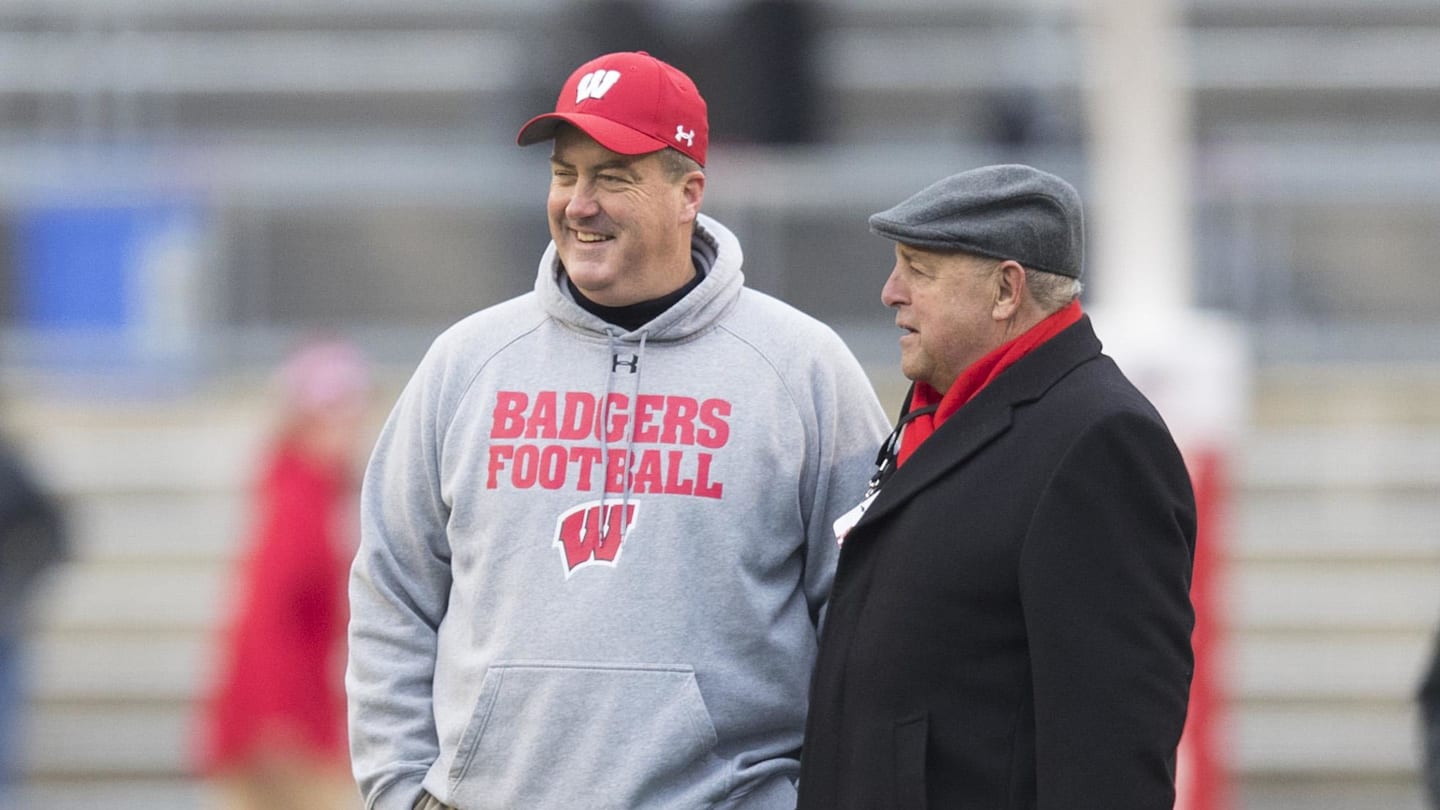Louisiana
Louisiana State Police investigating case of in-custody death in Rapides Parish
/cloudfront-us-east-1.images.arcpublishing.com/gray/F4QWR4Z4BFBIRN4ZL64BITGIUE.png)
ALEXANDRIA, La. (KALB) – Louisiana State Police has confirmed that it is investigating the in-custody death of a Rapides Parish inmate who died in a hospital apparently following an interaction with the Alexandria Police Department.
LSP shared that the case was referred to them back on April 26 by Rapides Parish Sheriff Mark Wood and APD’s interim police chief, Chad Gremillion.
We first told you about this case in May when we learned of a federal civil lawsuit that was filed by the mother of Rose Marie Taylor, who died on May 30, 2022. Taylor’s mother retained Attorney Jermaine Harris. And, the lawsuit is against three APD officers, the City of Alexandria, and Sheriff Mark Wood.
The lawsuit claims that on May 17, 2022, Taylor was in her vehicle in the parking lot of the Siegel Select Hotel on MacArthur Drive talking to her girlfriend, who was standing outside and was a guest at the hotel. The lawsuit claims that two APD officers, Brian Frost and Matthew Frost, arrived separately, approached Taylor, asked her for an ID and asked her to step out of the vehicle. Apparently, a struggle ensued, and Taylor was handcuffed.
The lawsuit alleges that what transpired next involved Taylor being pushed on the hood and ending up at the jail, reportedly for a loitering claim. While at the jail, Taylor asked to go to the hospital and was eventually taken by a third responding officer, Alexander Helminger, who is also named in the lawsuit. But there is an allegation that APD signed a written refusal that Taylor did not want to be treated.
Two days later she was found unresponsive in her cell. Initially, according to the lawsuit, it was believed that Taylor overdosed in the jail and Narcan was administered. After she died in the hospital, an autopsy revealed she had an adrenal hematoma and blunt force injuries.
A pathologist called it a “homicide.”
So far, only Sheriff Wood has submitted a response to the lawsuit in which he largely denied the allegations made. The family’s attorney said he is pleased that state police are taking a look at the case, as is Taylor’s uncle, who spoke to us on Thursday, June 6.
“State police have a broader view,” said Harris. “They’ll be able to go in and access things that we were not able to access. We’re hopeful that they will cast a wider net and that they are able to look at it through the perspective of the arrest and also from the perspective of her treatment and medical treatment at Rapides Parish DC-1.”
“The way we were treated was egregious,” said Robert Jordan, the victim’s uncle. “It really was, nobody reached out to my sister or the family to say we are sorry for your loss, or we are going to investigate. We really had to push Wood to open up an investigation with LSP. We went to every law enforcement agency at that time and basically none of them did anything until now. Now that it’s gaining traction, it shouldn’t take this much fighting and pushing for them to investigate to find out who, what, when and where caused my niece’s death, simple as that.”
As far as the federal lawsuit is concerned, it is unknown if that matter would be “stayed” pending the results of the state police investigation. Sheriff Wood is represented by Brad Calvit and Eli Meaux. APD officers Matthew Frost, Brian Frost and Alexander Helminger are represented by Misty Shannon Antoon.
Click here to report a typo. Please provide the title of the article in your email.
Copyright 2023 KALB. All rights reserved.

Louisiana
Housing advocates warn public encampment ban carries risks for Louisiana

A relocation notice is posted in front of a makeshift shelter at the Earhart Boulevard homeless encampment Jan. 13, 2025. Those living near the corridor were take to a state-operated transitional center in Gentilly. (John Gray/Verite News)
A bill requiring local governments to enforce a ban on sleeping on public property passed through a Louisiana legislative committee Wednesday within the hearing’s final minutes, though housing advocates and groups that serve the homeless say it remains problematic in its current form.
The proposal, House Bill 619 by Rep. Alonzo Knox, D-New Orleans, would direct local governments to enforce a ban on “public camping” or face possible lawsuits. Local governments could instead designate government-sanctioned encampments – much like the recent state-operated “Transition Center” in New Orleans – in areas where they wouldn’t “materially affect the property value” of homes or businesses.
Any resident or business within 1,000 feet of an illegal public camp, as well as a local district attorney, would be able to sue local governments if they failed to enforce the ban.
Knox’s bill also requires homeless service providers who receive state funds to provide detailed documentation of their work to municipalities upon request or else lose their funding. Unity of Greater New Orleans, the leading nonprofit serving the city’s homeless population, has drawn scrutiny from Knox and others for not providing more specific data on how it spends federal dollars.
SUBSCRIBE: GET THE MORNING HEADLINES DELIVERED TO YOUR INBOX
Knox has repeatedly accused housing nonprofits of waste and decried the “homeless industrial complex.” He pushed for the legislative audit of New Orleans’ Continuum of Care providers earlier this year. It found that the city and Unity spent $216 million between 2019-24, with the majority of funds going toward permanent supportive housing.
The audit also found that shelters need better oversight to ensure they’re meeting minimum health and safety standards.
When Knox’s measure was brought up Wednesday in the House Committee on Health and Welfare, it was after hearings on two other bills spanned more than three hours. Chairman Rep. Dustin Miller, D-Opelousas, noted that 11 people wanted to speak against Knox’s bill but wouldn’t have time because the House had already convened on the floor.
Committee members were given the option to defer Knox’s bill until next week but chose instead to continue the meeting. With limited time, Miller limited the opposition to just three speakers. Two attendees who’ve experienced homelessness were among those who didn’t have the chance to speak.
Knox agreed to amendments suggested by Rep Chris Turner, R-Ruston, which included changes in how the bill defines dwelling structures and extended the timeline for encampment clearing notices. Committee members suggested that the amendments should remove opposition to the bill.
But opponents said the amendments did not allay their concerns, and in some cases even increased the risk of harm.
‘Serious legal and ethical conflicts’
The state-sanctioned encampments proposed in Knox’s bill parallel Gov. Jeff Landry’s recent transition center in New Orleans, set up at a warehouse in a remote industrial section of the city. Unsheltered people were taken there from encampments downtown just before the Super Bowl.
Knox toured and praised the site while it was open, but his bill has sparked questions about how money for housing can be spent most efficiently.
Landry’s transition center, which cost about $17 million, ultimately placed 108 people in permanent supportive housing. Since 2023, Unity of Greater New Orleans has spent $2.3 million to permanently house 275 people, according to the audit.
The state spent about $100,000 per person on the warehouse site over 10 weeks, compared to the $20,000 per year it costs to provide housing and support services per person, said Angela Owczarek with the Jane Place Neighborhood Sustainability Initiative, a housing rights advocacy group.
A pandemic-era emergency rental assistance program, which ended last year, cost about $3,000 per New Orleans household to prevent homelessness for those facing eviction, Owczarek said.
Elsa Dimitradis, executive director of Acadiana Regional Coalition on Homelessness and Housing, testified that she had “serious concerns” about Knox’s bill, particularly the mandate about sharing client information with local governments. She warned the potential violations of privacy and disability laws could jeopardize $93 million in federal funding for housing nonprofits across the state.
Unity of Greater New Orleans is already suing the state for trying to compel the organization to produce protected information about its clients, such as medical histories and Social Security numbers.
Dimitradis also testified that the bill as written “appears to allow for open-ended demands at any time without clear standards or limitations,” which is “an operational threat.”
Hannah Adams of the National Housing Law Project argued the bill should provide exceptions to the ban if local governments are actively working to rehouse people.
“Clearing an encampment when social workers are actively working to rehouse individuals does interfere with their ability to maintain contact and secure long-term housing for their clients,” Adams told the committee.
The audit, likewise, noted that unexpected NOPD sweeps and state pressure to clear encampments contributed to delays in the city’s rehousing efforts.
Monique Blossom, director of policy at Louisiana Fair Housing Action Center, also warned that by directing state officials to inspect group homes, the bill risks violating the federal Fair Housing Act, opening the state to liability. The bill could lead to the shuttering of some group homes, including domestic violence shelters, sober living homes and even homes for seriously ill children who need to stay near hospitals, she said
Donna Paramore, executive director of the Travelers Aid Society of Greater New Orleans, told Illuminator the group is in “strong opposition” to the bill despite the amendments.
“The framework it proposes still undermines essential safeguards for vulnerable populations,” Paramore said. The issues outlined by Dimitradis “could jeopardize federal funding” and “create serious legal and ethical conflicts,” she added.
Paramore also noted her nonprofit undergoes an independent financial audit each year and has never had an adverse finding. She said that instead of banning public encampments, the state should expand supportive housing, behavioral health services and trauma-informed care.
Knox dismissed objections at the close of the hearing, calling some “technical and nitpicking.” He rejected Adams’ request for leniency when social workers are actively working on rehousing someone.
“If that language were to be included, they will always be ‘actively working,’” Knox said.
The representative’s office did not respond to a request for comment after hearing.
Knox’s bill was advanced to the House floor without objection.
Louisiana
Authorities search for escaped Louisiana inmate; was unaware murder suspect was missing until tipped off by public

Authorities in Louisiana are looking for an inmate who escaped jail for the second time in a year after a member of the public tipped them off Thursday.
Tra’Von Johnson, 19, was awaiting trial in Tangipahoa Parish Jail for his alleged role in a 2022 Hammond-area home invasion where a man was killed and his child was injured, according to the Tangipahoa Parish Sheriff’s Office.
The sheriff’s office said it received a call just before 10 p.m. on Thursday from a member of the public who asked if Johnson was still in custody.
“Following an immediate headcount of the jail population and a review of Johnson’s movements throughout the day, it was determined Johnson escaped around 4:30 p.m. when another inmate helped lift him over the perimeter fence,” the sheriff’s office said in a statement, adding that Johnson was the only inmate to have escaped Thursday.
No information was immediately available about anyone who allegedly assisted Johnson in his escape.
This is Johnson’s second escape from the jail in a year, according to the sheriff’s office, who said he was one of four inmates who broke out of the facility “a year ago this month.” Details about Johnson’s 2024 escape were not immediately available.
The sheriff’s office said it called on law enforcement partners for help in the search to find Johnson, alerted victims of his escape and contacted his family members and “known associates.”
Johnson is 5 feet and 5 inches, weighs 120 pounds and is from the Tickfaw area, according to the sheriff’s office. Anyone who sees Johnson or has information on his whereabouts is encouraged to get in touch with the sheriff’s office.
Johnson’s escape isn’t the only prison break that has plagued Louisiana this week.
A week ago in New Orleans, 10 inmates escaped the Orleans Parish Justice Center, a realization that was discovered during a routine headcount. Five of the 10 inmates have since been apprehended, with the remaining five still at-large.
Sterling Williams, a maintenance worker at the facility, has been accused of cutting off the water so inmates could pull the toilet from the wall, leading to their escape, according to officials, who also said three employees were placed on leave without pay. It’s not clear whether Williams was one of those employees.
More than 200 law enforcement personnel are assisting in the search for the five who remain at large, officials said.
Louisiana
The Louisiana Senate passes contentious car insurance bills. See who won and who lost.

Gov. Jeff Landry showed who’s the boss at the State Capitol when he rammed a car insurance bill through the Senate late Wednesday night over the vehement objections of Insurance Commissioner Tim Temple and business trade groups.
House Bill 148 would grant the insurance commissioner greater authority to reject “excessive” rate increases, which Landry has said several times would prompt him to blame Temple if rates remain high. With a last-minute amendment sought by the governor, HB148 also would require insurance companies to make their rate filing requests public. They say this could force them to expose trade secrets.
But balancing out the scales, the Senate also passed five bills that affect who can sue and how much they can collect – measures that Temple, the insurance industry and their business allies say would reduce payouts and thus reduce rates. The Senate passed the bills over the opposition of trial lawyers and their Democratic allies.
“What just passed out of the Senate, and if passed into law, would be the most comprehensive insurance reform in Louisiana’s history,” said Sen. Patrick McMath, R-Covington. “These changes are geared toward addressing the unaffordable car insurance crisis in Louisiana.”
Sen. Jay Luneau, D-Alexandria, offered a different take.
“We’re just taking away more people’s rights, and rates won’t go down,” he said, adding that the Senate’s rush to approve bills with late changes “leads to bad legislation.”
Temple supported the pro-insurance industry bills that passed but slammed the rate increase bill.
“It’s a false claim that rates are high because the commissioner doesn’t have some magical power,” he said. “It doesn’t address the fundamental problem in Louisiana – bodily injury and legal abuse.”
In sum, senators said, Landry emerged as the big winner politically, while Temple and the insurance industry appear to have had mixed results, with trial lawyers seemingly on the losing end.
Wednesday’s late night action sets up Landry to sign a raft of car insurance bills as early as Wednesday next week, legislative sources said.
He will sign all five bills passed by the Senate Monday night, the governor’s office said Thursday, although whether all five bills will have won final House approval by then is not clear.
The fight over how to address high car insurance rates has been the highest profile political battle since the legislative session began in mid-April.
Landry and legislators have been pulled by both sides throughout, with Temple and his business allies on the offensive and trial lawyers and their allies playing defense.
The governor has repeatedly positioned himself in the middle, saying he doesn’t like billboard lawyers (although he went turkey hunting in Texas with several prominent trial attorneys just before the session began) but also believes that insurance companies are earning big profits in Louisiana.
In a speech Thursday in New Iberia, Landry said a study by the National Association of Insurance Commissioners shows that Louisiana is an outlier on one key metric: “Our minor injury claims are double the national average,” he said.
Temple has said Louisiana has had twice as many minor injury claims as New York even though that state counts five times as many residents.
Senate President Cameron Henry has been talking with Landry and Senate colleagues for days about how to handle the nearly 20 pro-insurance industry bills that passed the House.
Henry, R-Metairie, outlined his plans to Republican colleagues Wednesday afternoon in a private meeting in the Senate dining room: the Senate would approve five bills.
House Bill 450 by Rep. Michael Melerine, R-Shreveport, would require someone who sued over injuries in a car accident to show that the injuries actually occurred during the accident. HB450 goes to Landry for his signature.
House Bill 434 by Rep. Jason DeWitt, R-Alexandria, would disallow a driver without car insurance from collecting an award for bodily injury medical expenses for any amount below $100,000, up from $15,000 today. HB434 also goes to Landry for his signature.
House Bill 431 by Rep. Emily Chenevert, R-Baton Rouge, would bar drivers responsible for at least 51% of an accident from receiving a damage award to cover their injuries. Under current law, a driver responsible for, say, 51% of the accident can collect a payment equal to 49% of the overall damage award. Because of an amendment added to the bill, HB431 needs House approval before it can become law.
House Bill 436 by Rep. Gabe Firment, R-Pollack, would prohibit undocumented immigrants who are injured in car accidents from collecting general damages. HB436 requires the House to accept the Senate changes to the bill.
Senate Bill 231 by Sen. Mike Reese, R-Leesville, would allow lawyers for insurance companies to tell jurors how much people injured in wrecks actually pay in medical bills. Under current law, jurors hear the total amount billed, regardless of what the plaintiff paid. A House committee is slated to take up SB231 next week.
Temple said HB431, HB450 and SB231 would “move the needle forward.”
Senate Democrats argued against the five bills, saying the Legislature has passed a host of pro-industry bills over the years, yet rates never come down.
Luneau, Sen. Sam Jenkins of Shreveport and Sen. Royce Duplessis of New Orleans all offered amendments to the Republican-sponsored bills that, if passed, would mandate a 2% reduction in rates. Republicans rejected those amendments on each bill.
Democrats also pointed to an April report by the National Association of Insurance Commissioners which said that in 2023, insurance companies in Louisiana had the third highest underwriting profit, the fourth lowest loss ratio and the fifth highest return on net worth.
As part of Henry’s plan, the Senate also would adopt HB148 – the measure that Landry most wanted and that Temple didn’t want – after it had been amended.
HB148 is the only bill Landry testified in favor of during the legislative session, saying last month that Temple should want to have greater authority to hold down rates.
Senators expressed reluctance privately in recent days to advance the bill because it didn’t require the commissioner to cite actuarial data in rejecting proposed rate increases.
But Landry lobbied hard to get them to approve it Monday night, senators said Thursday. The amended version now includes actuarial language.
Sen. Kirk Talbot, a River Ridge Republican and a close friend of Henry’s, pushed the bill through the Senate.
That task fell to Talbot even though he has been one of the insurance industry’s strongest allies.
Talbot didn’t return a phone call Thursday.
HB148 returns to the House for approval of the Senate changes.
-

 Technology1 week ago
Technology1 week agoLove, Death, and Robots keeps a good thing going in volume 4
-

 Technology1 week ago
Technology1 week agoMeta asks judge to throw out antitrust case mid-trial
-

 World1 week ago
World1 week agoCommissioner Hansen presents plan to cut farming bureaucracy in EU
-

 Movie Reviews1 week ago
Movie Reviews1 week agoClassic Film Review: ‘Mad Max: Fury Road’ is a Lesson in Redemption | InSession Film
-

 Politics1 week ago
Politics1 week agoDem senator says 'no doubt' Biden declined cognitively during presidency
-

 News1 week ago
News1 week agoVideo: Doctors Heal Infant Using First Customized-Gene Editing Treatment
-

 News1 week ago
News1 week agoNew Orleans jailbreak: 10 inmates dug a hole, wrote ‘to easy’ before fleeing; escape plan found
-

 World1 week ago
World1 week agoLeak: Commission to launch PFAS clean-ups in water resilience strategy




















